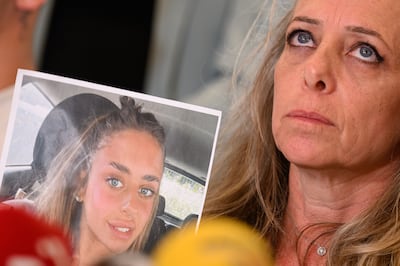Live updates: Follow the latest news on Israel-Gaza
A medical team working with families of Israeli hostages has said at least 180 people abducted by Hamas militia require immediate medication for life-threatening and chronic conditions.
Medics described the holding of the hostages without medical support as a "ticking time bomb".
The group of physicians, healthcare professionals, volunteers along with the Hostages and Missing Families Forum have submitted a list of medicines urgently required by hostages to the International Red Cross in Tel Aviv.
“The stories are horrible, many people have disabilities and complications, their suffering is unimaginable,” Prof Hagai Levine, who heads the forum’s medical team, told The National.
“Among the kidnapped people are Jews, there are also Muslims and Christians. They are from 25 different nationalities.
“We collected the data in a clinical way from the families to understand this unimaginable misery, this hell itself when civilians were abducted from their homes.”
About 200 people were abducted from their homes and a music festival near the Gaza border on October 7 by Hamas militants who crossed into southern Israel on Saturday launching a surprise attack in which at least 1,300 Israelis were killed.
Children with autism
The medics have collated a list of specific drugs required by hostages for conditions ranging from heart ailments to diabetes from 700 family members.
“These are just the pure medical facts. It’s a ticking bomb, some of them will die and some are worsening all the time,” said Prof Levine, who is a senior epidemiologist at the Hebrew University’s Hadassah Braun School of Public Health.

“An elderly woman has dementia and Parkinson’s. There are children aged 13 and 16 with autism spectrum disorder who need close family members and without them they are agitated.
“A child like this would not understand what is going on and would lose his mind from being held in this condition.”
He said patients with chronic conditions required daily medicines.
heads the medical team of the Hostages and Missing Families Forum
“A 27-year-old woman with an inflammatory bowel disease will need constant drugs, otherwise she may have a stomach perforation and would just die slowly,” said Prof Levine.
“Someone who is diabetic needs insulin regularly or would get clots in the hands, heart and kidney. A child with epilepsy will have more and more attacks.”
Other vulnerable cases included a nine-month-old baby who relies solely on formula, a 60-year-old man with multiple sclerosis who cannot walk independently and an 85-year-old woman with heart ailments and kidney disease.
Wounded hostages
Hamas has shared videos of hostages who were dragged onto motorcycles and hauled into cars before being driven to towns in Gaza.
The forum team has spoken to family members who received frantic phone calls from wounded relatives and watched videos posted online of loved ones shot at point blank range.
“We know hostages who lost a hand, another lost his leg, a woman was shot in the abdomen — they clearly lost a lot of blood,” he said.

“If they survive the blood loss, they may get infections and could die of the medical complications. They must be examined by a doctor and get medical assistance now.
“Every day they are suffering is an increased risk to die.”
Israel has warned more than 1.1 million people to leave the northern Gaza Strip as the country ramped up bombing ahead of an expected ground invasion.
Hamas has threatened to execute Israeli hostages when air strikes were conducted on Gaza without warning.
The medics hope for safety of the hostages and the people of Gaza.
“As a physician I’m worried for the health of everyone,” Prof Levine said.
“As physicians, we have not seen hostages with chronic medical conditions being taken ever before.
“For them to survive, we must do our best to bring them back home as soon as possible.
“I’m a believer and I also believe that potentially if there is a humanitarian corridor — it will help both the hostages and also the people living in Gaza.”

